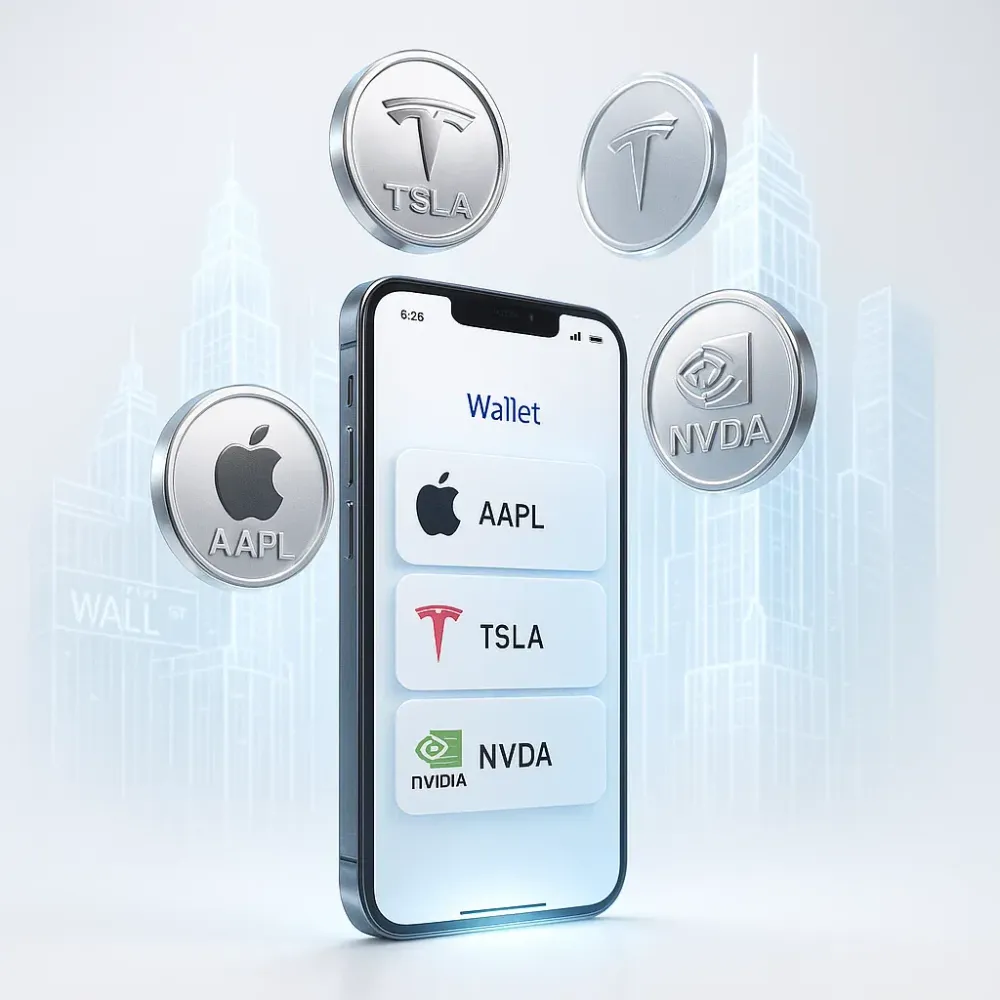How Crypto Wallets Push Wall Street Toward a 24/7 Blockchain Economy
📱💸 How Crypto Wallets Are Turning Wall Street Into a 24/7 Blockchain Economy
From Apple shares in Lagos to Tesla trades in Manila — non-custodial wallets are breaking Wall Street’s time zones. Tokenized stocks + self-custody wallets = borderless finance.
⚡ Quick Hits
- 🏦 100+ tokenized U.S. stocks already tradable in DeFi wallets
- ⏰ 24/7 trading vs. Wall Street’s 9:30–4:00 ET schedule
- 🍎 Fractional shares: Apple, Tesla, Nvidia, Nasdaq indexes
- 🔗 On-chain custody: no brokers, no middlemen
- 🌍 Impact: Global access to U.S. equities from anywhere
🧩 From Risky Experiments to Real-World Backing
Tokenized assets aren’t new. Early MakerDAO synthetics or Synthetix mirrors promised global stock exposure — but weak liquidity + regulatory fog killed the buzz.
Then came FTX’s collapse, reminding everyone how fragile “synthetic stock” plays really were.
The new wave fixes that:
- ✅ Backed 1:1 by real securities
- ✅ Audited regularly
- ✅ Investor protections even in bankruptcy
- ✅ Liquidity tied to Wall Street exchanges
This isn’t fantasy finance — it’s Wall Street, rebuilt for the blockchain age.
🪙 Stablecoins Walked So Tokenized Stocks Could Run
Stablecoins dragged the U.S. dollar on-chain and became the backbone of crypto trading, remittances, and DeFi.
Now, tokenized equities are following the same path:
- Buy Tesla shares like you send USDT
- Trade Nasdaq-linked tokens anytime, anywhere
- Own fractions of Apple for the price of a coffee
For emerging markets, this is revolutionary. No brokers. No banking red tape. Just a wallet.
📲 Wallets Are the New Brokers
The game-changer? Wallet UX.
Imagine a freelancer in Lagos or Manila:
- Paid in USDT
- Pays bills via QR code
- Tucks leftover funds into tokenized Apple stock — all in the same app
This isn’t theory. It’s happening. Wallets now bundle payments, savings, and investing, just like mobile money leapfrogged banks in Africa and Asia.
🏆 Who’s Leading the Shift
- Non-custodial DeFi wallets → 100+ tokenized U.S. stocks live, on-chain settlement included
- Asset-backed tokenization → unlike Bybit’s derivatives or Injective’s Helix, these stocks aren’t “synthetic bets,” they’re tied to the real thing
- Market makers → ensure liquidity, echoing Wall Street but without the closing bell
🚧 Challenges Ahead
- 💧 Liquidity: past tokenized stock projects died when buyers disappeared
- ⚖️ Regulation: governments still debating how to tax + classify tokenized securities
- 🎓 Education: TradFi investors may take longer to trust wallets-as-brokers
🌐 Bigger Picture
This is the second wave of financial tokenization:
- First: Stablecoins turned dollars into crypto-native assets
- Now: Tokenized stocks are putting Wall Street inside your wallet
Wall Street isn’t disappearing. But its 9-to-4 rhythm looks outdated when DeFi wallets are open 24/7.
If adoption scales, your stock portfolio, your paycheck, and your stablecoins could live in one app.
✍️ TL;DR
Crypto wallets are turning into global brokerages. With 100+ tokenized U.S. stocks, 24/7 trading, and on-chain custody, anyone worldwide can buy Apple or Tesla without Wall Street hours or middlemen. Like stablecoins before them, tokenized equities could reshape global finance — bridging TradFi and DeFi into one borderless system.

Recent News
All Time High • Live
Have questions or want to collaborate? Reach us at: [email protected]










